- Home
- Patrick Robinson
The Delta Solution Page 25
The Delta Solution Read online
Page 25
Which left Jack and Ray owning small apartments in the Northwest and running through a list of totally unsuitable girlfriends, who at first thought it glamorous to be with wealthy international mariners, until they thought better of it.
Dominic Rayforth was still married. Barely. His wife and four children lived in the suburbs of Seattle and had reached the point where no one cared whether or not he came home. He provided for his family generously, but he kept a couple of girlfriends on either side of the world and had convinced his wife that his tours of duty were six months, rather than four. The previous year had seen him home for five weeks total.
All three of them were married to the Global Mustang. Every month their salaries were wired to their respective bank accounts: Pitman earned $300,000 a year; the other two got $250,000. And every six months they received $200,000 bonuses for their role in transporting hundreds of millions of dollars’ worth of gas safely around the world.
It was a lonely but also carefree existence. No bills to pay for their own living, plenty of money, and no worries for the rest of their lives. Kiley and Rayforth were fine with it. Jack Pitman, in his more reflective moments, understood he had paid one hell of a price for financial independence.
That night, staring out of the dining room’s portside windows, Jack could see the moonlight on the water. They were cutting through a black, calm sea and the ship was quiet. He had two watchmen on the bridge who occasionally scanned the radar screen, but essentially the Mustang was sailing herself on automatic.
If anything showed up that might impede them in the water, a couple of alarms would sound immediately, but the fact was that other vessels could pick up the colossal bulk of the LNG carrier in ample time to stay out of the way. For a skilled navigator, sailing the Mustang was relaxing, even boring. Jack, Ray, and Dominic could not remember a time when anything truly interesting had happened.
Everything was operated from the control panel on the bridge. Course and speed were set: They were through the Strait of Hormuz, down the Arabian Gulf, and heading south across the Indian Ocean, and the water was deep all the way. No rocks, no sandbanks, hardly any traffic. They were 760 miles from the point where they would make a hard easterly turn and head for the wide channel that cuts through the Maldives south of Male.
They finished dinner at 10:00 p.m. and sat chatting over coffee. Dominic had spent time browsing the Internet and noticed a breaking story about a big Japanese factory ship being taken by pirates some four hundred miles to the southwest.
“Have they asked for a ransom?” wondered Jack Pitman.
“I guess so,” replied Dominic. “But it doesn’t say anything definite. I did see that Reuters was quoting the president of a fishing outfit way south on Kyushu.”
“Didn’t say whether they were paying up, did it?”
“Not really. But it’ll be the same as always—the cargo’s worth a bundle of money and the pirates only want about 5 percent of its value to send it on its way. Otherwise they’ll shoot everyone, scuttle the ship, and vanish into the night. It’s always easier, and a lot cheaper, to pay.”
“It’s the goddamned insurance companies that make the rules these days,” said Jack. “Because if a bad scenario takes place, like death or loss of ship or cargo, they end up footing a huge bill.
“And there’s the threat of heavy increases in premiums, which nobody wants but can’t afford not to pay. Seems to me the insurance outfits run the shipping lines. We’re getting to the point where we can’t live with them, but can’t live without them.”
“Well,” said Dominic, “you know one thing. They are always going to urge the owners to pay up. When Bob had that problem with the VLCC off Sumatra a couple of years ago, they said they’d share the cost of the ransom with him. They’re making it financially beneficial for themselves in the short term but encouraging the goddamned pirates to keep at it because they’re getting goddamned rich. Every time, seems to me.”
“I wonder what we’d do if they boarded us?”
“They seem to be boarding everyone,” said Jack. “But they’ve never boarded one of these things.”
“If they did, we couldn’t do much,” said Ray. “We have no weapons on board, nothing to shoot ’em with.”
“And you know why we don’t have anything to defend ourselves?” asked the captain sternly.
“Not really.”
“Because Bob’s insurers have threatened not to cover any ship that has guns of any type on board.”
“You wouldn’t think they’d care. And it would save a lot of ransom money if we had a couple of armed guards who could shoot the pirates.”
“Easier in one way, not in another,” said Jack. “Because there are lawyers out there just waiting to represent some poor Somali family whose pirate son got shot while he was climbing aboard. Poor kid, unarmed, just trying to hitch a ride, meant no harm to anyone . . .”
“Just get that weeping mother into the European court of human rights,” chuckled Dominic. “And give her 5 million bucks for the loss of her innocent son.”
“Jesus Christ,” said Captain Pitman. “How about a glass of brandy?”
CHAPTER 9
THE MOMBASSA RAN EAST ACROSS THE INDIAN OCEAN FOR FORTY more hours after the attempt on its crew and wealth. Her new engines ran flawlessly, never slowing below 15 knots on a calm sea with little wind. By 10:00 a.m. on Sunday morning, they had put six hundred miles between them and the spot where the Somali Star had gone down.
Captain Hassan had adjusted the radar to its long-distance mode and stood in front of the screen with Wolde and Ahmed while Kifle Zenawi drove the boat. And they watched the seas to the north for the paint of a really big oceangoing tanker, which, with its huge golden domes above deck, was almost certainly sixty or seventy feet higher in the water than a regular VLCC.
When the Global Mustang showed, it would be unmistakable and almost certainly travelling very fast, both through the water and, comparatively, on the screen. The crew ate cold goat sandwiches and drank iced coffee in the heat of the wheelhouse. They watched the green radar arm make its endless revolutions, pinging its findings, electronically relayed from the all-seeing dish that swung on the roof.
The message from New York had suggested that the Mustang was steaming straight down the sixtieth line of longitude and would make her left turn when she reached a point three miles short of the second northern parallel. The Mombassa’s GPS showed her three miles south of that line, positioned exactly at 60E, and everyone was hoping they had not missed their quarry.
If they had, they could hardly be blamed. They had arrived at their rendezvous on time and were set to track the Mustang until after dark. Captain Hassan believed the hours after 10:00 p.m. were most favorable for their attack because on a long voyage, many of the crew would be asleep. Ismael and Elmi went along with that. But first they had to find the ship.
Eleven o’clock came and went. There was not a sign of anything in this lonely part of the Indian Ocean, southwest of Cape Comorin, the southernmost tip of the Indian subcontinent.
They passed the time taping the grappling hooks with thick, black electrical insulator. The hooks had no need to be sharp enough to dig into the ground. They just had to be bent hard to grab and hook the ship’s rail. The thick tape would almost eliminate the clatter on the steel deck, muffling it to a dull thud, hopefully too dull to be heard by anyone.
When they had boarded the Niagara Falls, the metallic clatter had basically cost the ship’s first mate his life. Wolde had shot him, and he understood the ramifications. Stealth was the key, and the absence of metal clashing with metal would help.
But at fifteen minutes before noon on that Sunday morning, there was still no sign of the Mustang, and Captain Hassan decided to move further east. He would run at flank speed for a half hour, just in case the LNG tanker had cut the corner and begun to beat southeast a couple of hours early.
At 12:30 the Mombassa was still south of the second parallel, but there wa
s no sign of the Mustang anywhere to its north. And the radar was set to twenty-five miles. Admiral Wolde debated calling home base and maybe checking with Mr. Salat’s source. But Elmi Ahmed advised against it because if the Mustang suddenly showed, they’d look jumpy and unprofessional.
At 1:00 p.m. the Global Mustang hit the screen. It was a big paint, bright and sharp. No chance that it was weather or a small fishing boat or even a medium-sized freighter. This was one of the ocean’s giants.
“It’s gotta be her,” breathed Ismael. “She’s heading southeast and she’s going fast.”
“She would be,” grumbled Elmi, who would probably be the first man up the hull of the great ship, right next to Wolde.
“We’ll stay well south of her,” said Hassan. “But we can’t let her get away. We’d never catch her.”
Once more they headed east, running miles out of sight but somehow in tandem with their target.
“You planning to close in on her during daylight hours?” asked Admiral Wolde.
“No, sir,” said Hassan. “There isn’t any point. We have a much better chance of staying invisible in the dark. And this is a hell of a good radar.”
All through the afternoon they ran fast along the horizon from the Mustang . One of the Filipino watchkeepers on the bridge saw the pirate ship far away to the south, but he never gave it a thought. The sheer size of his tanker inevitably induced a feeling of mild contempt among its crew.
When darkness finally fell, before 7:30, the Mustang became an even more splendid sight. Her deck lights went on and floodlit the four massive golden orbs that shaped her almost nine-hundred-foot profile. She was cutting through the night waters glowing golden bright, a Liberace jewel of the deep, hauling a near-priceless cargo directly to the Orient.
Captain Hassan changed course shortly before 9:00 p.m. He was still moving east and still had the throttles open, in order to lay up with the Mustang. But the Mombassa had come fifteen degrees north to zeroseven-five, and she was running dark, with her red-and-green navigation lights switched off.
Captain Hassan understood he could not catch up and overtake the Mustang. The most he could do was drive the Mombassa directly into her wake and follow her dead astern. He’d then let the skiffs flash over the last two miles at 30 knots and move in port and starboard, right below the aft rails, for the boarding.
It was a little after 10:00 p.m., and he had the Mombassa running absolutely flat out, close to 22 knots. His biggest problem was the Mustang’s speed. The huge tanker made 530 yards every minute, so if they stopped for four minutes to launch the skiffs, get aboard, and take off, the Mustang would be a mile and a quarter farther away.
That made every second count. Because even the Mustang’s idle bridge crew might notice that she was being hotly pursued by a couple of speedboats making 30 knots in the middle of the Indian Ocean.
Captain Hassan understood this was a very vulnerable part of their mission. If someone sounded the alarm, the stern deck would be swarming with sailors, and they might be armed. Also there would be zero chance of hurling the grappling irons without having them thrown right back, probably killing someone.
The Mombassa was shuddering with the demands being made on her engines, and at 10:23 p.m. the captain suddenly throttled right back and shouted, “STAND BY TO LAUNCH!”
Immediately the two drivers, Abadula Sofian and Hamdan Ougoure, climbed into the already loaded skiffs, one on the portside, one on starboard. The four juniors began to lower away, with Wolde and Ahmed hanging on to the painters attached to the bows of the skiffs, playing out the two lines that slipped though their hands.
By the time the assault boats splashed down in the water, the Mombassa was stopped. Both Yamaha engines on the skiffs, finely tuned by the mechanics on the Haradheere beach, fired first go. For the moment, Wolde and Ahmed made them fast on the stern fishing-net cleats, and everyone climbed over the gunwales, their gleaming AK-47s slung over their backs.
The junior pirates went first, then Kifle Zenawi, followed by Omar Ali Farah, Ibrahim Yacin, and Abdul Mesfin. Ismael Wolde and Elmi Ahmed, each carrying taped bundles of dynamite, were the last to jump down into separate boats.
Everything else was loaded, the hand grenades, the grappling irons already lashed to the knotted ropes, the brass-rung ladders, the heavy machine gun, and, in case of dire emergency, the launcher for the RPG7 missiles, which were stored in a wooden box, one in each boat.
Captain Hassan, expertly trained by the Somali Marines missile director, Elmi Ahmed, had the other launcher on board the Mombassa, plus four missiles. On the word of command over the phone from Admiral Wolde, he would slam one of them straight into the Mustang’s high bridge and hope to hell it didn’t blow up half the world.
Wolde thought it could be done without penetrating the stern holding dome, but Hassan better be as accurate as any missile man had ever been. This last move was one of desperation and would not be implemented unless something shocking had occurred—either the assault team was suddenly in a life-or-death situation or was about to go over the side into the water.
With the engines chugging slowly, but out of gear, Hassan raced to the stern and released both skiffs, throwing the lines skillfully inboard, as the two small boats backed away and then roared forward, their bows arching upward and quickly flattening out as the Yamahas settled into a highspeed mode.
The launch of the skiffs had taken only two and a half minutes, which put the Mustang two miles ahead, plus only three-quarters of a mile. The pirates would close the gap at the rate of 10 knots an hour in about seventeen minutes.
The megawatt illumination of the LNG tanker cast its brightness all over the place. What should have been a fast approach over black water suddenly felt as though they were flying over a Hollywood film set. The skiffs and their crews were actually casting shadows on the water as they raced in.
There was no escape. Everything around the tanker was in a light field. Wolde and his teams were like prisoners under the Nazi lights, trying to make the wire in Stalag 17. The scene lacked only Billy Wilder standing on the bow with a bullhorn.
Ismael Wolde had never been so scared. The whine of the motors was so loud in the night, and the floodlighting so penetrating, he was counting the seconds, preparing to tell Abadula to peel away left, back into the dark.
There was only one place on the entire ocean surface where there was shadow. And that was hard against the hull of the tanker, where the light could not reach. Whether or not they could make it to that doubtful haven without being spotted was, in Ismael’s opinion, about ten-to-one against.
In truth, Wolde had no concept of life on these ships, the impersonal nature of the men who sailed them from so high up, one hundred feet above the water. Whatever else, this remoteness from the sailors’ traditional element instilled in them all a complete loss of intimacy with the sea.
Modern-day tanker men had practically nothing in common with any mariners from other ages. Because these ocean giants give the impression of being shore-bound. Because they need almost no seamanship while in transit between ports. Somewhere down below the decks, there are humming caves propelling her forward, providing every possible requirement for power. There is a permanent emptiness about the gigantic main deck. Hardly anyone ever goes out there.
The crew, like its sea-borne home, performs automatic duties. There are cooks, mostly foreign, laundrymen, and cleaners, and the ship follows a predictable pattern, which scarcely varies on the bridge. The gigantic bulk of the gas carrier slows everything down. Her solidity on the waves removes the feeling of possible danger. Ships like a fully laden Global Mustang can smash their way forward, however bad the sea. They can shove aside the very worst that nature hurls at her, and hardly anyone even notices she has done so.
Driving through the tropical night above the unfathomably deep waters of the Indian Ocean accentuates a crew’s indifference to its element. They can play table tennis, watch movies in the ship’s cinema, watch television, pl
ay cards, send e-mail.
Up on the bridge, the watchkeepers chat and sip coffee, checking the radar screen every hour. Nothing happens for hours, days, weeks on end. There is only the impression of unassailable steadiness.
The thought that the Global Mustang was a minute away from a murderous, multimillion dollar, life-threatening pirate attack was nothing less than outlandish—as if the White House butler were about to kick the president straight in the ass.
Admiral Wolde and his men reached the shadow of the hull without anyone on the Global Mustang having the remotest idea they were there. Abadula and Hamdan were in direct phone contact as they steered left and right out of the wake and made their way to separate sides of the ship’s stern. Both helmsmen cut their engines back, trying to fix zero relative speed to the monster they had almost grabbed.
However the sheer bulk of the Mustang had caused her bow wave to roll almost her entire length, and the skiffs were riding up and then down six to eight feet, almost being sucked into the steel hull plates.
Wolde and Elmi Ahmed, on different sides of the ship, stared up and gasped. The hull towered above them. It may have been no more than thirty feet to that stern rail, but when the skiffs rode down on the wave, it looked like two hundred feet.
Wolde grabbed his helmsman’s open phone line and snapped to Hamdan in the other boat, “Can Elmi throw the grappler on the rise?”
“He thinks he can,” replied Hamdan. “And he’s ready to go if you are.”
“Ready,” said Wolde. “Let’s go right now. One grappler either side. I don’t want the damned things clattering around everywhere. Tell him to meet me up there.”
And with that, he began to whirl the big, heavily taped hook on the end of the knotted rope. One, two, three times he completed a full circle, and the sound of the rope sang on the light wind. On the fourth swing he let go, and in the searing lights of the great ship, the exposed tips of the hook glinted as the grappler flew upward about twenty degrees off the perpendicular. Wolde thought it might not reach, but somehow it snaked over the rail, landing with a clump but no clatter.

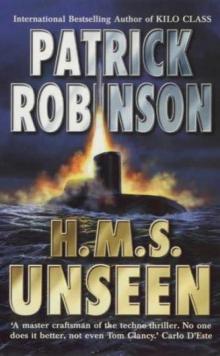 H.M.S. Unseen am-3
H.M.S. Unseen am-3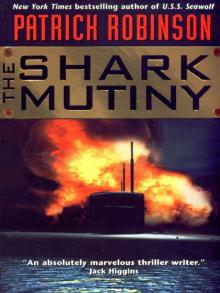 The Shark Mutiny (2001)
The Shark Mutiny (2001)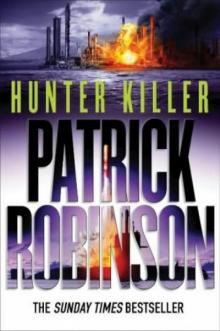 Hunter Killer am-8
Hunter Killer am-8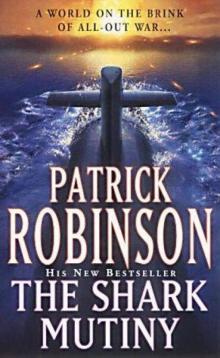 The Shark Mutiny am-5
The Shark Mutiny am-5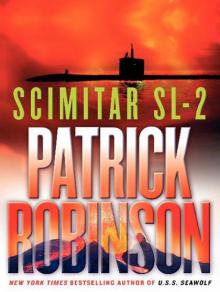 Scimitar SL-2
Scimitar SL-2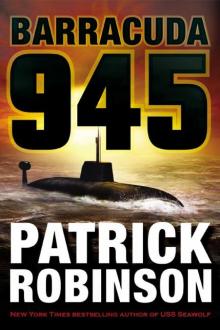 Barracuda 945 am-6
Barracuda 945 am-6 Hunter Killer
Hunter Killer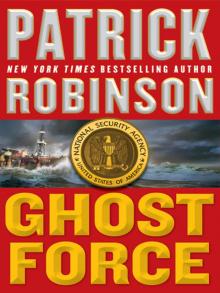 Ghost Force
Ghost Force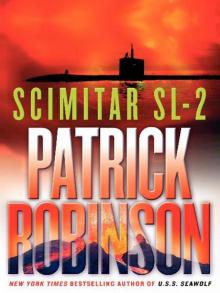 Scimitar SL-2 (2004)
Scimitar SL-2 (2004)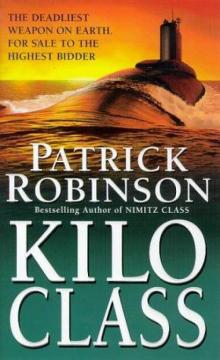 Kilo Class am-2
Kilo Class am-2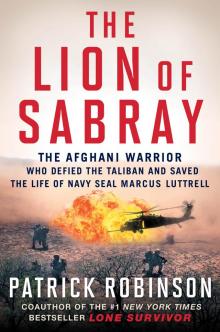 The Lion of Sabray
The Lion of Sabray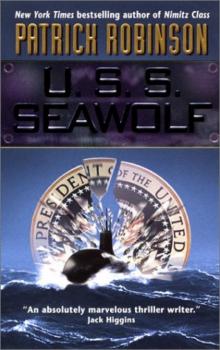 U.S.S. Seawolf am-4
U.S.S. Seawolf am-4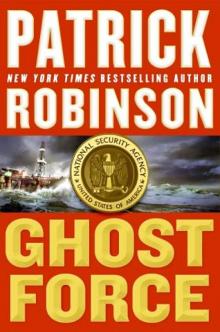 Ghost Force am-9
Ghost Force am-9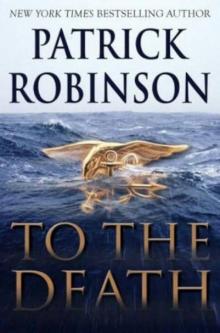 To the Death am-10
To the Death am-10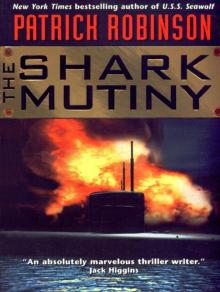 The Shark Mutiny
The Shark Mutiny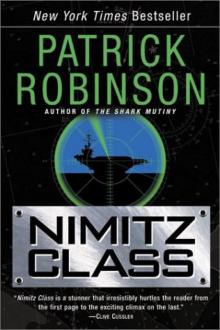 Nimitz Class am-1
Nimitz Class am-1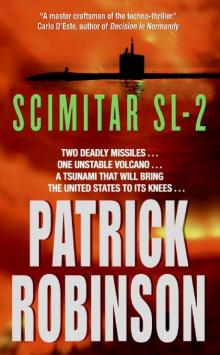 Scimitar SL-2 am-7
Scimitar SL-2 am-7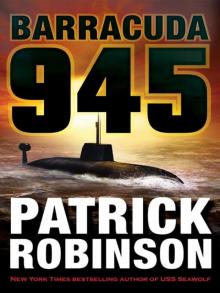 Barracuda 945
Barracuda 945 Intercept
Intercept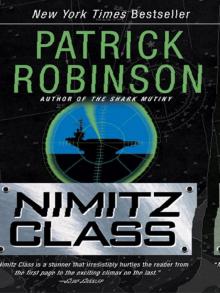 Nimitz Class (1997)
Nimitz Class (1997)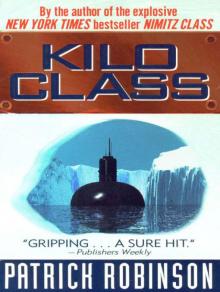 Kilo Class
Kilo Class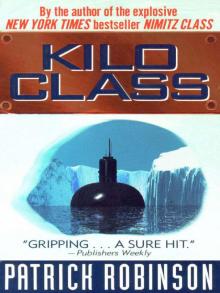 Kilo Class (1998)
Kilo Class (1998) Diamondhead
Diamondhead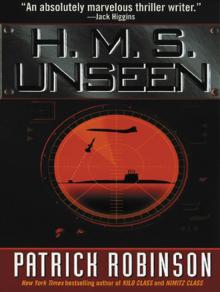 H.M.S. Unseen
H.M.S. Unseen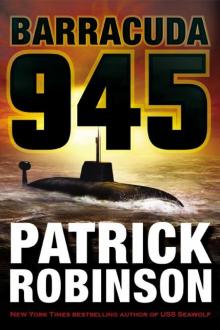 Barracuda 945 (2003)
Barracuda 945 (2003)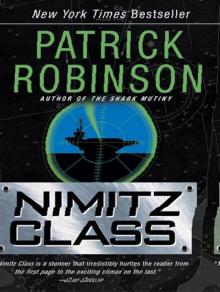 Nimitz Class
Nimitz Class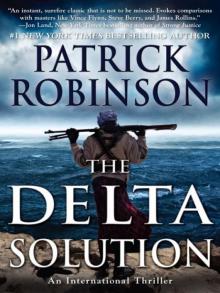 The Delta Solution
The Delta Solution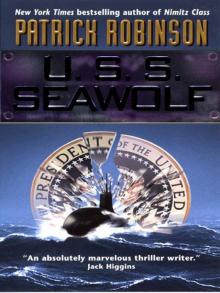 U.S.S. Seawolf
U.S.S. Seawolf